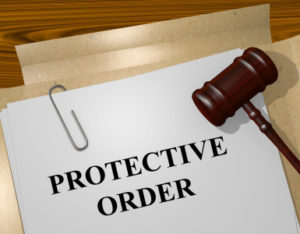A protective order in Oklahoma is a document that is issued by a civil court that instructs another person that is abusing, stalking, or harassing you to cease their actions or face punishment by the court. 
There are two types of protective orders: temporary protective orders and permanent protective orders. A temporary protective order is put in place as an emergency and lasts until the permanent protective order hearing. A permanent protective order can last up to five years.
A protective can only be filed against a family or household member. This actually includes a large list of individuals, including a spouse, ex-spouse, current spouse of an ex-spouse, parents, grandparents, stepparents, children, grandchildren, stepchildren, anyone related to you by blood or marriage, anyone living with you or anyone who used to live with you, anyone with whom you have had a child, and anyone you are dating or used to date.
Evidence Needed for a Temporary Protective Order
Temporary orders are also known as emergency ex parte protection orders. These can be filed without the abuser’s knowledge or presence in the courtroom. The court assumes that you will also seek a permanent protective order if you are filing a temporary one.
The burden to prove abuse is low. The judge will review the complaint that your family law attorney completed on your behalf and will rule based on the information given.
Your family law attorney will ask you to gather information on your abuser in order to complete the complaint. This information includes the abuser’s name, address, phone number, employment address and phone number, make and model of car, license plate, and any drug abuse history or gun ownership.
It is also important for you to be prepared to discuss the most recent event of abuse with your family law attorney so they can describe that in the complaint. Your attorney will help you draft a factual account of abuse without the unnecessary irrelevant information that is common when completing a complaint on your own.
Emergency orders are effective until the permanent order hearing, which usually takes place about three weeks after a temporary order is filed.
Evidence Needed for a Permanent Order
Witnesses
A permanent protective order lasts up to five years, therefore the burden to prove the abuse, harassment, or stalking is higher. Your family law attorney will help prepare you and witnesses to the abuse for the hearing.
You will want to have a list of anyone that saw the abuse or your injuries, anyone you told about the abuse, or anyone who witnessed your home or property in a state of disarray as a result of abuse.
Documents
Other evidence includes police reports. It is important to report all incidents even if they seem small. Pictures of your injuries, as well as medical reports, are extremely important to present at your hearing.
911 Recordings
If you dialed 911 during any abusive event you can request copies of the tapes (there may be a fee for this). They also may erase tapes after a certain period of time, so requesting the tapes in a timely manner is necessary.
Criminal Records
Criminal records can also be influential in your case. If your abuser has a history of violence, drug abuse, or criminal activity this may help secure your permanent protective order in Oklahoma. Your family law attorney can present certified copies of your abuser’s criminal record as evidence at your hearing.
Initial Consultation with a Tulsa Divorce Lawyer
Remember that the court is here to help and protect you, and your family law attorney will make sure your abuse is factually communicated to the judge. Keeping sufficient records of your abuse will help you and your attorney present a competent case and ensure the abuse stops.
Contact an experienced Tulsa divorce lawyer when you need to go through the Oklahoma emergency and permanent protective order process.
For a low-cost confidential consultation, call now: 918-924-5526.
